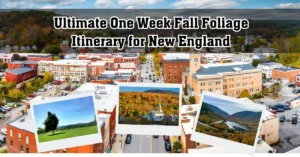Thinking about moving to North Carolina? You’re not alone. With its picturesque landscapes, growing cities, and Southern charm, the Tar Heel State has been attracting thousands of newcomers every year. But before you pack up your life and head south, it’s important to know that North Carolina—like any state—has its drawbacks. In this post, we’ll break down 12 real reasons not to move to North Carolina, especially if you value transparency when making a big life decision. You should also know about laws to know before moving to North Carolina.
1. The Humidity and Unpredictable Weather
North Carolina’s weather can be tough to adjust to. Summers are hot, humid, and sticky, especially in cities like Charlotte and Raleigh. If you’re coming from a dry climate, you may find it uncomfortable.
Intense Summers
Temperatures often hit the high 90s, with humidity making it feel well over 100°F.
Hurricane Season
Coastal areas are vulnerable to hurricanes from June through November. Flooding and storm damage are real concerns in regions like Wilmington.
Snow? Sometimes.
Western NC does get snow, but the rest of the state gets just enough to cause panic—with little infrastructure to handle it.
2. High Pollen and Allergy Issues
North Carolina is a hotspot for seasonal allergies, particularly in the spring and fall. Raleigh and Charlotte frequently make national lists for worst cities for allergy sufferers.
-
Expect heavy pollen covering cars, sidewalks, and porches.
-
Allergy symptoms can last months, not weeks.
If you’re sensitive to pollen or mold, you may want to reconsider.
3. Limited Public Transportation
Unless you live in a major metro area, you’ll need a car. Public transportation is underdeveloped, even in cities like Raleigh and Durham.
Car-Dependent Culture
You’ll spend a lot of time (and gas money) commuting or running errands.
Few Bike-Friendly Cities
Suburbs and smaller towns often lack sidewalks or safe bike lanes.
4. Growing Cost of Living in Urban Centers
While North Carolina is often seen as affordable, urban areas are getting expensive fast.
-
Home prices in Charlotte and Raleigh have skyrocketed.
-
Rent is increasingly out of reach for many.
-
Property taxes and insurance premiums are rising.
If affordability is a major factor, NC’s big cities may disappoint.
5. Overcrowded Cities and Urban Sprawl
Rapid growth has led to traffic congestion, overdeveloped suburbs, and a strain on infrastructure.
-
Charlotte’s growth has outpaced its planning.
-
Raleigh is expanding in all directions, but roads and schools haven’t kept up.
-
Smaller towns are losing their charm to endless construction.
6. Conservative Politics and Culture in Many Areas
While cities like Durham and Asheville are progressive, much of the state leans conservative.
-
Rural vs. Urban Divide: Cultural and political values can differ greatly.
-
Some newcomers feel unwelcome depending on their identity or beliefs.
If social or political values matter to you, research your area thoroughly.
7. Bugs, Snakes, and Wildlife Concerns
North Carolina’s warm, humid climate is perfect for… bugs.
-
Cockroaches are common—even in clean homes.
-
Ticks and fire ants are everywhere in summer.
-
Snakes (mostly non-venomous) can show up in backyards or trails.
Living here means sharing space with nature—sometimes uncomfortably so.
8. Limited Job Opportunities in Smaller Towns
Unless you’re in tech, finance, or healthcare (especially in the Research Triangle), job opportunities can be scarce outside urban centers.
-
Rural areas may offer fewer professional roles and lower pay.
-
Economic development is uneven across the state.
-
Remote work helps, but not everyone has that option.
9. Educational Disparities Between School Districts
Public education in North Carolina is a mixed bag.
-
Urban districts like Wake County have decent schools.
-
Rural counties often face teacher shortages, outdated materials, and lower funding.
-
School quality can vary drastically from one district to the next.
If you have kids, you’ll need to research schools carefully.
10. Crime Rates in Some Urban Areas
While many NC cities are safe, crime rates are a concern in certain neighborhoods.
-
Durham and Fayetteville see above-average crime rates.
-
Property crime is more common than violent crime in tourist-heavy areas.
It’s crucial to dig into neighborhood-level data before choosing where to live.
11. Tourist Overload in Scenic Areas
Love the idea of moving to the mountains or the beach? You’re not alone—and that’s the problem.
-
The Outer Banks and Blue Ridge Parkway are gorgeous but often jam-packed.
-
Asheville’s popularity has led to rising costs and crowds.
-
Some locals report losing their sense of community to seasonal tourism.
12. Lack of Four Distinct Seasons in Some Regions
Depending on where you live in North Carolina, the seasons may disappoint.
-
Coastal and Piedmont areas have long, hot summers and mild winters.
-
Fall and spring are short-lived.
-
Western NC has more seasonality but also more snow and ice.
If you’re hoping for four balanced seasons, you may not get that everywhere.
Final Thoughts: Is North Carolina Really That Bad?
Absolutely not—but it’s also not perfect. Every state has its ups and downs. North Carolina is beloved by many, but that doesn’t mean it’s right for everyone. The goal here isn’t to bash the state but to provide a more complete picture so you can make an informed decision.
Before making a move, consider spending a few weeks exploring different regions. Talk to locals, research school districts, and understand what matters most to you.
FAQs on Reasons Not to Move to North Carolina
Is it worth moving to North Carolina?
It depends on your lifestyle, job prospects, and climate preferences. For some, it’s a dream. For others, the drawbacks outweigh the benefits.
What are the downsides of living in NC?
Weather, bugs, traffic, public education disparities, and rising living costs in urban areas are commonly cited cons.
What is the quality of life like in NC?
Varied. Some enjoy a high quality of life, especially in well-developed areas. Others struggle with job access or infrastructure.
How bad are allergies in NC?
Very bad for sensitive individuals. The pollen count is among the highest in the U.S. during spring and fall.





